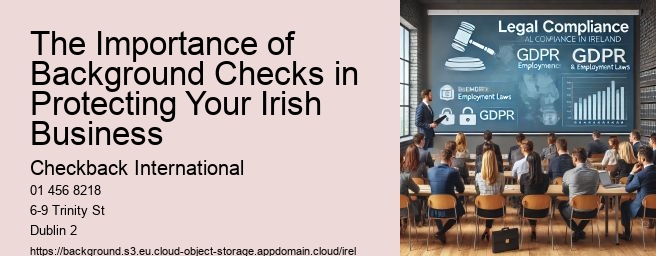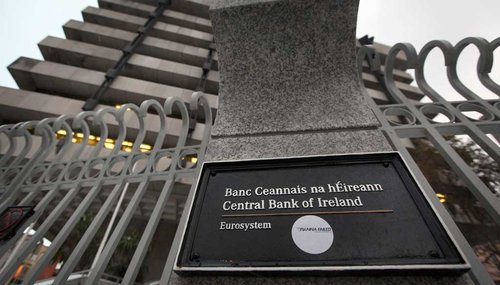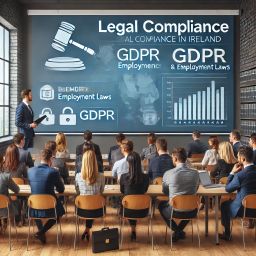

The processing time includes verification across multiple databases, including registered judgments, court records, and European inspectorates.
The standard turnaround time for consumer credit checks ranges from 24 to 48 hours, supporting quick decision-making in recruitment processes.
3.Compliance Verification: Following both Irish and European Data Protection legislation.
Different industries require varying levels and types of background checks. Employment Screening Services The specific requirements depend on security needs, regulation requirements, and potential liability risks within each sector.
The criminal record verification process in Ireland checks multiple databases and jurisdictions to screen candidates.
During pre-employment screening across Europe, organizations follow background check protocols set by EU regulations and individual member states.
Complete vetting checks stop unsuitable people from working in security positions, which helps maintain public safety.
Clients get documentation checklists and direct help from account managers.
Role of Technology in Enhancing Background Verification Working through pre-employment screening under data protection laws, companies use technology to improve the efficiency of background verifications. Automated systems speed up employee background checks, reducing completion times through online checks for education, employment history, and criminal records.
Best Practices for Handling Background Check Information in Ireland

Companies appreciate how background checking providers handle complex information professionally and discreetly. The quick process helps recruitment and gives companies confidence that new hires meet compliance standards.
These services help reduce hiring risks and maintain regulatory compliance.
PSA background checks in Ireland are central to maintaining high standards in security-related occupations. Through examination of criminal history, educational and employment background, and personal character, these checks support the reliability and integrity of professionals in the security sector. The processes and regulatory compliance with PSA vetting shape security professions and meet current industry standards.


The standards require vetting candidates for the previous 5-year period or from when they completed secondary education. This includes checking educational, employment, and personal character references, along with statutory declarations.
Companies conduct various background checks in Ireland to determine if candidates match their job requirements. These checks help verify information and assess suitability for positions.
4.Credit and Financial Checks: Reviews financial status of potential employees for positions of trust.

Can Employment Vetting Reveal Medical History or Health-Related Information?
International qualifications need different verification processes than domestic credentials.
Are Social Media Profiles Legally Considered During the Vetting Process?

Conclusion
2.Reports must include verification from national authorities like Garda, DBS, and Department of Justice.
Legal Framework and Compliance Standards
Child Protection VettingA background check in Ireland involves reviewing a person's criminal, financial, or personal records to assess their suitability for a role or position.
The duration can vary but typically takes between 1-2 weeks, depending on the type and complexity of the check.
Garda vetting is a specific type of background check required in Ireland for individuals working with children or vulnerable adults, involving checks against police records.
Yes, you must obtain consent from the individual before conducting any background checks in Ireland.
Not for all employees, but certain sectors such as healthcare and education may require comprehensive checks.
It includes checking for any criminal convictions or offences recorded against the individual.
Yes, individuals can request their own background checks in Ireland for personal review or to prepare for employment screenings.
Skipping background checks can lead to hiring unsuitable candidates, which may result in legal and reputational risks.
Yes, police clearance is a general criminal record check, while Garda vetting is specific to roles involving vulnerable groups and includes more detailed investigations.
You can request transcripts or degrees directly from educational institutions or use third-party services that specialize in educational verifications.
Information about spent convictions, certain types of personal data, and other protected characteristics under GDPR is off-limits unless specifically relevant and lawful to access.
International checks may involve additional complexities such as different laws, languages, and longer processing times.
No, background checks do not affect your credit score as they do not involve a credit inquiry that would impact the score.
Best practices include securing data in compliance with GDPR, limiting access to authorized personnel, and ensuring data is stored for only as long as necessary.
It depends on the industry and role, but typically every 2-3 years or when significant changes occur in the individual’s role or responsibility.
While not specific by law, many IT positions require checks due to access to sensitive or proprietary information.
GDPR regulates the processing of personal data, ensuring that background checks are conducted in a lawful, fair, and transparent manner.
Yes, but it must be done lawfully and with the individual’s consent, considering the relevance to the role.
Penalties can include fines, legal actions, and reputational damage, depending on the severity of the non-compliance.
Remote work has increased the importance of thorough background checks, especially for those in positions of trust or handling sensitive data.
Best practices include conducting similar checks as for permanent staff, especially if they have access to sensitive or critical areas.
Ensuring fairness involves following consistent procedures, obtaining consent, and allowing candidates to dispute inaccuracies.
Yes, it’s recommended to tailor background checks based on the specific risks and requirements of each position.
Signs include transparency about services, compliance with legal standards, positive reviews, and strong data protection practices.
Handling involves assessing the relevance to the job, discussing findings with the candidate, and considering legal and ethical implications.